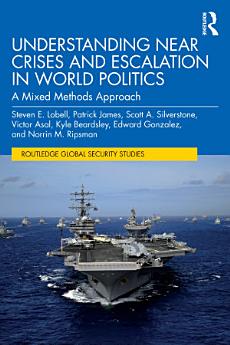Understanding Near Crises and Escalation in World Politics: A Mixed Methods Approach
About this ebook
These time-sensitive disputes between states, and even with violent non-state actors, do not involve significant risk of military escalation, at least in the moment. Investigating how and why some near crises escalate, while others do not, requires an explanation of the different dynamics of international disputes and the policy tools that states and international institutions can employ. We ask an expanded set of questions about specific cases and general patterns of conflict behavior, such as: why did Israeli leaders respond to Hezbollah’s 2006 cross-border raid with escalation, resulting in the Second Lebanon War, while in previous instances the Israelis limited their retaliation? Why didn’t the 2015 Iranian Ballistic Missile Test or the 1995 Norwegian Black Brant Missile Launch escalate, while the 2009 North Korea Missile Movement and the 1995 Taiwan Straits dispute tipped into a full-blown crisis, and why did the 2008 Russia-Georgia conflict escalate from near crisis to war? We use primary sources and newly created data on near crises to answer these questions and others. The overall conclusion is that an ounce of prevention at the near crisis phase is worth a pound of cure in averting a full-blown crisis or war.
This book will be of great interest to students of security studies, conflict studies, foreign policy, and international relations.
About the author
Steven E. Lobell is a Professor in the Department of Political Science at the University of Utah, USA.
Patrick James is the Dean’s Professor Emeritus of International Relations at the University of Southern California, USA.
Scott A. Silverstone is a Professor of International Relations at the United States Military Academy at West Point.
Victor Asal is the Director of the Center for Policy Research and Professor of Political Science at the University at Albany, USA.
Kyle Beardsley is a Professor of Political Science at Duke University, USA, the Director of the Triangle Institute for Security Studies, and the Co-Director of the International Crisis Behavior Data Project.
Edward Gonzalez is an Instructor of Political Science at Compton College, USA.
Norrin M. Ripsman is the Monroe J. Rathbone Distinguished Professor of International Relations at Lehigh University, USA.
Shikshya Adhikari works as a Research Associate. She has experience working with advanced statistical techniques and data analysis tools. She is a mixed-methods researcher. She has worked for humanitarian response projects. She has an M.A. in Political Science and an M.S. in Sociology.
Suzanne Weedon Levy currently serves as the Director of Grants for a non-profit in New York’s Capital Region. Prior to transitioning to the non-profit sector, she spent almost a decade as the Research Director of the Project on Violent Conflict (PVC) at the University at Albany, where she focused on the behavior of terrorist and insurgent non-state actors.
Grace Sorci currently works as a Senior Research Associate at The Chicago Lighthouse. At the time of this project, she served as a Research Aide and Project Supervisor for the Project on Violent Conflict (PVC) at the University at Albany.
Nakissa Jahanbani is an Adjunct Lecturer at the Pennsylvania State University and a Senior Analyst at the Afghanistan War Commission in the Senate. Her research focuses on how states partner with violent non-state actors.
Anne van Wijk obtained her PhD in Political Science and International Relations from the University of Southern California in 2022. In her dissertation, van Wijk discusses the constraints under which states operate as members of international organizations and untangles how and when international cooperation is likely to break down.





